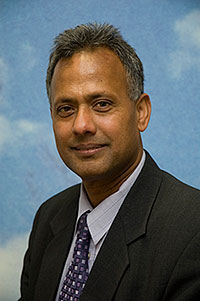BRICs Economy and the Shifting Power in the 21st Century

Thu, 25 Feb 2016 09:49:00 GMT
The Business School's Emerging Markets Research Group (EMERGE) heard Dr Kalim Siddiqui from the University of Huddersfield Business School, present his research on the development of the BRIC economies and shifting economic power in the 21st century.
Kalim Siddiqui's work, which combines elements of international and development economics, economic policy, economic history and political economy, often challenges prevailing orthodoxy about which policies promote overall development in less developed countries. His research focuses on international trade, uneven global development, growth and distributive issues..
Kalim says "The study of the BRIC economies is important for a number of reasons including: their rapid economic growth rates, large populations, and fast growing markets for goods and capital. The four countries (Brazil, Russia, India and China) have 40% of the world population (i.e. 3 billion people) and India and Brazil especially have higher birth rates than the global average. Their combined economy is 25% of the global GDP in 2015 and it is projected that this will increase to 33% by 2020.
At present, the share of these economies in the global capital markets is about 3.5%. The per capita income of these four economies ranges from US$ 500 to US$ 4 500 and their total weight in the world economy is 10%. However, their average annual GDP growth exceeds 6%, which is much higher than world's average growth of 3.2% and even much lower for the OECD countries. Their share in the world economy will double in the next two decades, from 20% to 40%. It is also projected that in the same period per capita income will reach between US$ 2,300 and 16,600 i.e. nearly four times higher than what it is now. Thus the weight of these economies in the world economy will double to 20 % and the share of the world capital market will exceed 15%.
Moreover, the projections are that by 2015, China will become the largest economy in the world and India will be the third largest one. However, next on the ranking in terms of output will be Russia and Brazil. The BRICS member countries have set up a Development Bank in 2015 which will lend money to all members for infrastructural projects and balance of payments problems. It is said that such steps would increase the "weight of South" in global governance and reduce their dependence on the IMF and World Bank."
Professor John Anchor, Director of the Emerging Markets Research Group, says "Although it is doubtful if the BRICs should be considered as a combined entity, their contribution to the world economy is of growing importance. Along with that of other emerging markets, such as Mexico, Indonesia, Nigeria and Turkey, it seems likely that they will continue to make an increasing contribution to world GDP."







